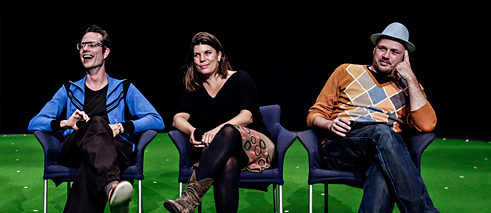Interview With Rimini Protokoll
The Goethe-Institut New York talks to Helgard Haug, Stefan Kaegi, and Daniel Wetzel, the trio behind the theater collective Rimini Protokoll, about their latest piece, Top Secret International (State 1), a smartwatch-based interactive theater production dealing with international networks of intelligence services and state secrets. The production premieres at Münchner Kammerspiele on December 9, 2016, and will be presented in the US for the first time as part of The Public Theater’s Under the Radar Festival in New York in January 2017.
As much of your documentary theater, Top Secret International (State 1) places experts at the center of the performance. Equipped with smartwatches, the audience listens to the stories of secret service agents and employees. How do you convey the reality of experts whose jobs and lives depend on secrecy?
Helgard Haug: We are in the middle of the development phase of this project and are talking to a whole lot of people who collect information and turn it into a sellable product. But we’re also meeting people who experienced the flow of information being impeded or observations being interpreted falsely or to their detriment. By approaching the subject of secret services, we are recording our meetings, conversations, and deliberations—creating the plot—for Top Secret International (State 1). In other words, we’re mapping our searches. The audience members become accomplices who have to find their way in the jungle of information and non-information, just like we did during development.
The piece will take place in classical museum collections: anonymous spaces in which Cold War agents met to exchange information á la James Bond. Why did you choose this setting?
Daniel Wetzel: It is a place not preferred for conspiratorial meetings, as we learned. Because it’s much too obvious who approaches whom and it is rather silent there. We like contrasting what we share in questions and thoughts around secret services with another layer of collective memory of heroism, colonialism, faith, fate, emotions like devotion and pride, etc.
How does the production explore the transition from peer-to-peer surveillance to the big data cloud?
Helgard Haug: It’s not just a radio play where a smartwatch is being used to pass on information. This gadget lets us put together a personal story for each viewer depending on their decisions; so the viewer is tracing clues while at the same time becoming detectable, leaving behind clues and data that are then incorporated into the system.
Taking on the role of players, the audience is guided through different levels in which they are trained as agents, exchange information, and spy on other players. How does documentation become fiction and vice versa in this game?
Helgard Haug: We are not trying to compete with Hollywood. Instead, e guide the visitors into a certain, very direct situation in order to examine the world of intelligence together with them. Espionage is always about a sort of interpretive prerogative or reading of what is being observed. Our aim is to propagate doubt.
Since you began collaborating in 2000, you have moved to the forefront of the search for new theatrical forms. Where has the use of smart devices taken you in this search?
Stefan Kaegi: In recent years we have become increasingly interested not only in working with “everyday experts,” but also in involving the audience in what’s happening on stage. In Situation Rooms, which was last shown at the Luminato Festival in Toronto, 20 audience members each played for seven minutes the role of a soldier, an arms manufacturer, a dealer, or a refugee. But in Situation Rooms we add an entire environment of rooms built especially for these experts. Now the smartwatches allow us to use the movements of the viewers themselves as actuators of the stories, and to shift the action to the semipublic space of a museum.
Top Secret International (State 1) is part of a larger series, State 1–4, which engages with the post-democratic nation-state. How does the piece relate to the series and to your past work?
Daniel Wetzel: It’s all about dealing with the notion that the democratic systems we vote in are less in control of basic rights and values than we think. Other parts deal with lobbyism, with the Internet as some sort of new public space.
Interview by Hannah Abdullah
Rimini Protokoll
Rimini Protokoll is the label of the theater-makers Helgard Haug, Stefan Kaegi, and Daniel Wetzel, who have been working collaboratively since 2000. Their groundbreaking stage productions, sound and radio plays, films, and installations deal with the theatrical elements of our reality, placing experts instead of actors at the center.
